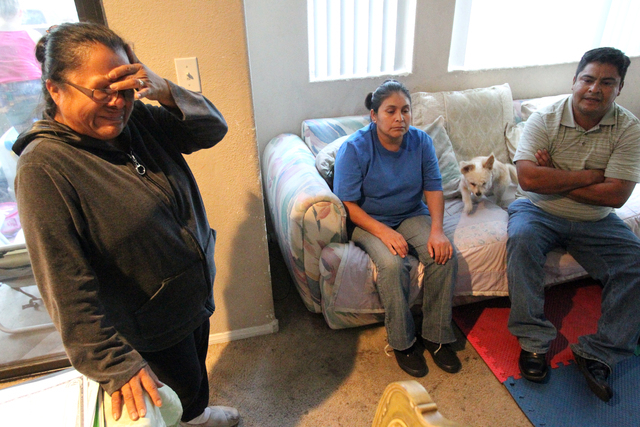Baby’s death again raises questions with few easy answers
If you were looking for an opportunity to give up hope for our beleaguered foster care system, the awful story of Michell Momox-Caselis provides it.
The fragile life of the 16-month-old girl was snuffed out Oct. 11 in a possible murder-suicide involving her foster father. The violent deaths have once again shined a critical light on the system and its oversight of some of the most vulnerable people in our society.
As reported by the Review-Journal’s Yesenia Amaro, Michell’s body was found dead of apparent asphyxiation in her crib Sunday morning in an apartment at the Oasis Vinings complex on Carmen Boulevard. A 9-month-old foster child inside the apartment was unharmed.
The body of Michell’s current foster father, Joaquin Juarez-Paez, was discovered in a car parked in front of the apartments. Police immediately set to work to piece together the facts surrounding the deaths.
Clark County Department of Family Services officials, meanwhile, started crafting a statement that began to express the disbelief those who work inside the overwhelmed foster care system were feeling. They provided few specific details but again repeated that foster parents are thoroughly screened and tutored before receiving children into their homes. Family Services Director Lisa Ruiz-Lee said that recruiting qualified foster parents becomes increasingly difficult following tragic incidents.
Although the county reminds skeptics that all foster care parents are “subject to federal and local criminal background checks as well as all central registries and Child Abuse & Neglect Systems (CANS) of each state in which they have resided in the past 5 years” and must undergo other study and scrutiny, there are no guarantees of safety. Foster care often is the last-ditch effort against oblivion for hundreds of local children each year already exposed to abuse and neglect.
And someone is bound to ask how two children were considered in an appropriate placement setting in a small apartment. Is the county having difficulty recruiting or overseeing Spanish-speaking foster parents? Are there lessons to learn from this tragedy?
Of course, systems that rely on orphanages and other government-run home settings also have their share of nightmare stories. There is no perfect model, but Clark County’s experiences are a reminder there’s plenty of room for improvement.
The Family Services mission statement is admirable and inspiring: “Protecting children from abuse and neglect by partnering with our community to build safe, nurturing and stable families, to support family preservation when possible, to provide permanent families for those children who cannot safely return home and to ensure the well-being of children in our care.”
But whether it can accomplish its mission under the current system is a subject of increasing debate.
As of August, the Department of Family Services had 1,169 licensed foster homes serving children with a wide variety of challenges ranging from abuse and neglect to special needs.
It had 2,732 children in foster, relative and therapeutic care, according to statistics kept by the county. Demographically, a majority of the children in the foster care system are caucasian.
With all that said, this is no time to lose faith in the mission of the foster care system. It’s the last best hope for scores of children. It makes more sense to revisit the system and funding than to write it off.
Services for Michell Momox-Caselis are scheduled for 2 p.m. Wednesday at David Funeral Homes and Memorial Park at 6200 S. Eastern Ave.
In the spirit of hope, and with the assistance of the nonprofit Legal Aid Center of Southern Nevada, a trust account has been set up in her name at the Bank of Nevada at 3985 S. Durango.
One child is beyond hope, but there are six other Momox-Caselis siblings and a system brimming with need.
John L. Smith’s column appears Sunday, Tuesday, Wednesday, Friday and Saturday. E-mail him at jsmith@reviewjournal.com or call 702-383-0295.














